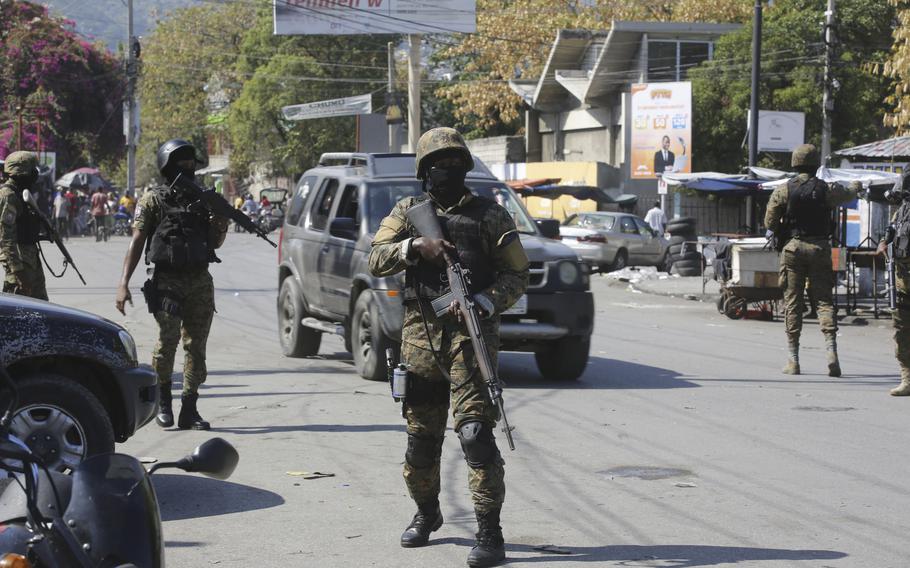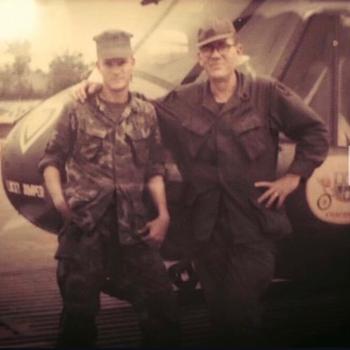
Members of the General Security Unit of the National Palace, USGPN, set up a security perimeter around one of the three downtown stations after police fought off an attack by gangs the day before, in Port-au-Prince, Haiti, Saturday, March 9, 2024. (Odelyn Joseph/AP)
WASHINGTON — Defense officials said Tuesday that the U.S. does not plan to deploy troops to Haiti and has no immediate plans to rescue Americans trapped by gang violence in the country, including a former Marine who served in Vietnam.
Marines flew into Haiti’s capital, Port-au-Prince, over the weekend to airlift nonessential embassy personnel out of the country. But there has not been a government request to evacuate other U.S. civilians, said Army Gen. Laura Richardson, commander of U.S. Southern Command, which oversees military operations in Central and South America and the Caribbean.
“As we work forward, as the administration creates a requirement for [the Defense Department] to bring out trapped Americans in Haiti, we will absolutely do that from SOUTHCOM,” she said during a House Armed Services Committee hearing.
The lack of a rescue mission leaves few options for Americans such as Boyce Young, a 75-year-old Marine veteran from Savannah, Ga., who traveled to Haiti for humanitarian work and is now stuck as gangs overrun the Caribbean nation.
Young arrived in Haiti on Feb. 16, just a couple of weeks before heavily armed gangs took over most of Port-au-Prince and began attacking police stations, prisons, the main airport, seaport and other state institutions.
The violence has led to the release of thousands of inmates, deaths of scores of civilians and a suspension of flights. It is also threatening the food and water supply as the main port in Port-au-Prince remains closed, stranding dozens of containers with critical goods.

Boyce Young in uniform in March 1968. (Kim Patterson)
Young is sheltering in a small village on the southwest coast of Haiti, where it is safe for now but too far and dangerous to travel to the Dominican Republic border, said his daughter Kim Patterson.
“We are literally just exhausting any avenue we can think of trying to get him out,” she said. “We’re a family from southeast Georgia just trying to figure out how to get our daddy home.”
Republicans on Tuesday assailed President Joe Biden’s administration for failing to initiate an evacuation of civilians not working for the embassy, describing it as another situation in which the U.S. has abandoned its citizens abroad.
“We’ve had multiple members of Congress rescuing U.S. citizens that were trapped in the West Bank and elsewhere in Israel, that were trapped in or are still trapped in Afghanistan,” said Rep. Mike Waltz, R-Fla. “We have a breakdown here between the State Department and DOD in terms of having assets and resources available to go get Americans.”
Patterson said her father has been added to a State Department list of Americans in Haiti but has not received any guidance about how he could leave the country. The department did not respond to a request for comment on Tuesday.
Young remains in good spirits despite the circumstances but “he’s ready for a plan, he’s ready to be out of there,” Patterson said.
Young was set to return home in early March after completing what was likely his last trip to the nation. He began going to Haiti about a decade ago to deliver medical supplies and provide other humanitarian aid.
“He fell in love with the country,” Patterson said.
She said she had reservations about her father’s latest plan to travel to Haiti amid an extraordinary wave of gang violence but Young was adamant about going and had no security concerns.
“He said, ‘I’m going to go. I’m not going to get any younger,’ ” Patterson said. “He wants to live a life with purpose and that’s how he viewed Haiti and going to help and I’m sure with the Marines, it was the same thing. He wanted to live a life of purpose.”

Boyce Young, left, in Vietnam in 1969 with his father, who was in the Army and on his second deployment to the country. (Kim Patterson)
Young joined the Marine Corps in 1968, deploying to fight in the Vietnam War, and left the service in 1970 as a sergeant, according to Patterson.
Richardson said the security situation in Haiti is “dire” as more than 300 gangs, numbering about 7,200 members, continue to wreak havoc. Haiti’s embattled prime minister, Ariel Henry, agreed to step down on Monday night.
Rebecca Zimmerman, who is performing the duties of assistant secretary of defense for homeland defense and hemispheric affairs, said the U.S. is discussing boosting security at its embassy in Tabarre, in the metropolitan Port-au-Prince area, but does not envision commitment of service members beyond that.
The Defense Department is instead largely financing a multinational security mission for Haiti that aims to train and help the Haitian National Police force restore law and order. U.S. funding for the Kenya-led mission doubled from $100 million to $200 million in recent days.
Rep. Lisa McClain, R-Mich., said the funding was appreciated but will be of little use to Americans looking for escape routes out of Haiti.
“The administration was able to pull out State Department staff in our embassy this weekend but made little attempt to rescue other Americans on the island,” she said. “The additional funding will not solve the problem.”
Gen. Laura Richardson, commander of United States Southern Command, testifies before the Senate Armed Services Committee hearing to examine the posture of United States Northern Command and United States Southern Command, on Capitol Hill in Washington, Thursday, March 24, 2022. (Jose Luis Magana/AP)